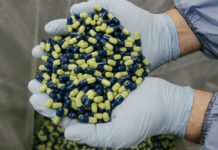Treating Addiction With an App
From MIT Technology Review: A new app, Triggr, is using smartphone data to track the behavior of people struggling with substance use and addiction, with...
Temperamentally Blessed
From Aeon: The finding that only one in five people avoid any kind of mental health problems or psychiatric diagnoses through their lives has prompted...
“Does Schizophrenia Exist on an Autism-Like Spectrum?”
The results of epidemiological studies of the prevalence of hallucinations strongly imply that psychosis exists on a spectrum, according to the Scientific American. This suggests “that the standard treatment for a psychotic episode might be due for an overhaul.”
The Tobacco Industry’s Links to Studies on Stress
In NPR’s health news Shots, Alix Spiegel discusses the secret funding funnelled by the tobacco industry into the earliest studies of the impacts of...
“More Patients in Scotland Given Antidepressants”
The BBC reports that the number of people in Scotland taking antidepressants has increased by 5% in the past year with most of the patients being women and those in the poorest parts of the country. “We are now looking at the flabbergasting statistic of more than one in seven people in Scotland being prescribed antidepressants this year,” Conservative health spokesman Jackson Carlaw said. “We urgently have to look at better alternatives than simply parking people on medication in the hope things don't get any worse, with no aspiration for complete recovery."
A Quiet Rise in Wildland-Firefighter Suicides
From The Atlantic: Over the past decade, there has been a quiet acknowledgement that suicide is widespread within the wildland firefighting community. Both the trauma...
Eating Oily Fish While Pregnant Could Prevent Schizophrenia
From The Conversation: According to a recent study from Japan, pregnant mice that are deprived of an essential fatty acid, called docosahexaenoic acid (DHA), are...
“US Opioid Epidemic Fueled by Prescribing Practices”
Medscape Psychiatry reports that the “man-made epidemic” of opioid abuse in the United States is the result of over-prescription and poor research.
Antidepressants and the Problem of Withdrawal
In this episode of WBUR's On Point Radio, Benedict Carey, author of the recent New York Times report on antidepressant withdrawal, discusses the topic of discontinuing...
Environmental Neurotoxins and Autism
-A discussion of some of the links that have been found between neurotoxins polluting the environment and higher risks of developing autistic symptoms.
New Resource Guide on Health and Mental Health Threats from Endocrine Disruptor Pollutants
The Endocrine Society and the global organization of non-profits IPEN have jointly released a new guide documenting the threats that endocrine-disrupting chemicals pose to...
‘Mental Illness’ is a Harmfully Misleading Phrase
From The Good Men Project: "Mental illness" is a misleading phrase that often exacerbates the pain of people in emotional distress.
Article →
What It Feels Like When Your Identity is Heavy
In this piece for Science of Us, Jesse Singal describes the burdensome stress of being a member of a minority group and having an identity...
Birthday Letter: Sylvia Plath and “Daddy”
In this piece for The Paris Review, Belinda McKeon analyzes the poetry and letters Sylvia Plath wrote in the few months just before her suicide.
Dateline NBC to Cover Child Psychiatric Overmedication Epidemic This Sunday
This Sunday, June 12 at 7pm (EDT) on NBCs Dateline will cover MIA author Steve Francesco's book, Overmedicated and Undertreated: How I Lost My...
“The Drugs That Built a Super Soldier”
"During the Vietnam War, the U.S. military plied its servicemen with speed, steroids, and painkillers to help them handle extended combat,” Lukasz Kamienski writes...
If Money can Make you Happy, can Debt Make you Sad?
From Aeon: While research shows that having financial resources contributes to our happiness and satisfaction, borrowing money and being in debt add to our dissatisfaction and...
Stop Labelling People Who Commit Crimes ‘Criminals’
In this piece for Aeon, Kimberley Brownlee argues that labelling people who commit crimes as "criminals," "offenders," or "perpetrators" is dehumanizing and reductionistic, defining a...
Have Smartphones Destroyed a Generation?
From The Atlantic: The pattern of constant smartphone and social media use among post-Millennials may be leading to a public mental health crisis. Research shows that...
Natural Disasters Have a Serious Impact on Mental Health
From Bustle: Natural disasters often inflict psychological harm on those who experience them, increasing the likelihood of PTSD in survivors. In addition to repairing physical...
Vets Who Receive Legal Aid Show Improved Mental Health
From Yale News: A new study shows that veterans who receive legal help with housing, benefits, and consumer or personal matters have increased income, fewer...
“Young Americans Have Been Getting More Anxious and Depressed, Why?”
According to Jesse Singal, “ever since the 1930s, young people in America have reported feeling increasingly anxious and depressed. And no one knows exactly...
“When the Brain is Under Attack”
The Boston Globe reports on the discovery of a newly recognized neurological disease, anti-NMDA receptor encephalitis. The disease is believed to be caused when the body’s immune system attacks proteins in the brain associated with the communication of neurons.
“The Second Brain in Our Gastrointestinal Systems”
-An excerpt from the book, The Good Gut: Taking Control of Your Weight, Your Mood and Your Long-Term Health.
A Standing Meditation for Self-Care
In this piece for On Being, Sharon Salzberg discusses the importance of self-care and describes a meditation technique that can help increase self-love and self-compassion.























